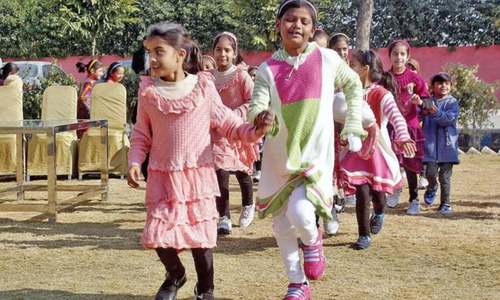The Islamabad High Court (IHC) on Saturday issued a charge sheet to Raja Khuram Ali Khan and his spouse, Maheen Zafar, the main accused in the Tayyaba torture case.
The police had earlier registered a case against former Additional District and Sessions Judge (ADSJ) Raja Khurram Ali Khan and his wife for keeping the minor in illegal confinement, burning her hand, beating her with a ladle, detaining her in a storeroom and threatening her of dire consequences.
In its charge sheet, the IHC details that it will try the accused for having committed six offences.
It details that the accused persons wrongfully confined the minor, Tayyaba, in their house; that Maheen Zafar caused injuries — multiple small wounds on cheek, burn wounds on arms, fingers and thighs — to minor Tayyaba.
The charge sheet also states that Maheen Zafar "extended threats of dire consequences to minor Tayyaba to not disclose her maltreatment to anyone".
Another offense was that Maheen Zafar and ADSJ Raja both "willfully assaulted, ill-treated, neglected, harmed and abandoned and injured minor Tayyaba, who was under their care".
The last offence involves Raja for "causing disappearance of minor Tayyaba in order to screen his co-accused Maheen Zafar from the legal consequences".
Signed off by Justice Mohsin Akhtar Kayani, the charge sheet states in clear words that the accused, who have pleaded not guilty to the charges, will be tried at the IHC.
The accused's counsel had earlier tried to scale the trial down to district court level, a proposition that was swiftly rejected by the IHC.
Case history
Tayyaba, who was allegedly tortured by former ADSJ Raja Khurram Ali Khan and his wife, was rescued from his house in Islamabad with visible wounds on Dec 28, 2016. A First Information Report was registered against him and his wife, Maheen Zafar, on Dec 29, 2016.
On Jan 2, 2017, the ADSJ reached a compromise with Tayyaba’s parents, on the basis of which Zafar secured pre-arrest bail from the court of ADSJ Raja Asif Mehmood the same day. On Jan 3, ADSJ Atta Rabbani had handed over custody of Tayyaba to her parents.
On Jan 4, however, the Supreme Court took suo motu notice of the matter.
The apex court had directed police to investigate the case from every aspect, and on a subsequent hearing on Jan 11, observed that the role of Chakwal-based lawyer Raja Zahoor Hassan — who began practice in Islamabad a couple of years ago — was of key interest with regard to the "illegitimate" compromise first reached between the suspects and the child’s family.
Chief Justice of Pakistan Saqib Nisar had remarked during proceedings that there was no doubt that a criminal act had been committed in the Tayyaba case.
The court had also directed the police to investigate how the compromise deed was prepared, as well as matters related to internal trafficking of child labour.
In its report, however, the police had focused only on the child’s abuse and the possible involvement of the suspects. On Jan 26, the SC had expressed displeasure with the way the police investigated the case.
The case was referred back to the IHC by the Supreme Court for further deliberations.
On Feb 10, in a hearing in the IHC on the matter Tayyaba's father had submitted an affidavit to a local court claiming her employers did not torture her, bringing the case back to where it was at the start of the year.
This was the second time Tayyaba's father made the claim.
Mohammad Azam, the child’s father, had dismissed media reports about Tayyaba’s abuse in the affidavit, saying that after looking into the matter he had concluded that both Khan and his wife were innocent.
On Feb 20, Maheen Zafar had submitted a written request to the interior ministry stating that the leader of a "mafia" is conspiring against her and her husband. "The mafia maligned Raja Khurram Ali Khan with fabricated stories," the request stated, adding that negative propaganda was created via social media reports of Tayyaba's torture.
After this, on Feb 26, the court adjourned the indictment of Khan and his wife till March 25.
In May, the IHC indicted Khan and his wife Maheen Zafar in the case and summoned witnesses for recording statements against them.
Maintaining that the alleged torture inflicted upon the juvenile was brutal and cruel, Justice Kayani rejected the compromise deed between the parents of the child, Tayyaba and the accused judge and his wife.
Justice Kayani noted that the application for compounding the offence with the girl’s parents was not maintainable as it was the State which had performed its duties and taken care of the child since the registration of the criminal case.
On June 2, the IHC formed a new bench to hear the case, as one of the judges on the bench recused himself from hearing the case, reasoning that he had earlier found the accused, Khan, guilty in a departmental inquiry.















































